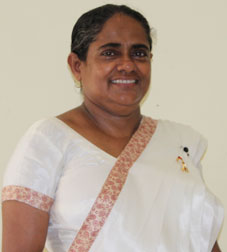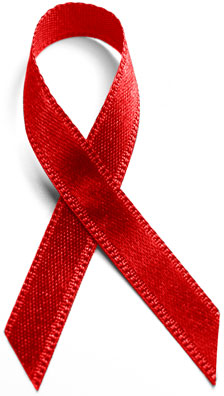Stained by the AIDS Stigma
One woman's courageous battle against the biases that
colour HIV patients immoral:
by Carol Aloysius
Stigma. It is a word that evokes hate, revulsion, violence. Most
lasting of all, prejudice. It is the biggest challenge those inflicted
by HIV/AIDS must face and endure throughout their limited life span, and
the reason why already confirmed patients refuse to continue their
treatment regimen despite the heavy investments made on their behalf by
the state.
|

Princey Mangalika |
For a country like Sri Lanka especially, the cost of anti viral
treatment is already straining the limited health budget. Yet, despite
effective interventions that have helped give HIV/AIDS positive patients
longer and a better quality of life, stigma and prejudice hold them
hostage, blighting their daily life and heedlessly trampling on their
rights.
Still more lamentable is the fact that the stigma also prevents
persons with suspected signs of the disease, from attending the Venereal
Disease clinics found in all parts of the island, to obtain the free
treatment available to patients irrespective of status, religion or
creed.
Sadly, even the medical profession has not escaped from the tainted
touch of Stigma...
That HIV is still not fully understood by even the medical
profession, was confirmed in a recent ILO sponsored study by the Health
Ministry. After finding the level of HIV stigma ranged from 42 - 45%
among heath workers including doctors, nurses, attendants and labourers,
it recommended that a participatory approach to a stigma reduction
programme for nurses with peer pressure could influence attitude change.
It further recommended that health care workers could benefit from a
refresher training on the Rights of HIV patients, and the professional
conduct and rules to be applied.
Rights
Admittedly, the Rights of HIV/AIDS positive patients is a long
neglected area- although they are already enshrined in our Constitution
and in various Acts to which Sri Lanka has been a signatory . While
their cause is often espoused by various non-governmental organisations
and female activist groups on public platforms on World AIDS Day, any
sustained campaign requires full commitment. For that, the active
participation of the victims themselves is required. Yet few HIV/AIDS
positive patients are willing to talk about their personal experiences.
Princey Mangalika is one courageous woman who not only volunteered to
fill that gap; she even set up a Foundation for AIDS Positive women to
network and encourage each other with their shared experiences. Her
other goal is to educate, especially those in the health sector, to
change their bias against HIV/AIDS positive women (and men) which she
says is one of the biggest drawbacks for their willingness to take
treatment.
Bitter
Princey's story is worth narrating. It is a story told from the
heart, the outpourings of a scorned and rejected woman due to stigma
against the disease and inspired from her own bitter experiences of the
cruel hardships she and her family faced the day her HIV positive
husband returned home from abroad, and passed on the disease to his
unsuspecting wife. That was the day, says the young home maker, the
stigma of AIDS became a menacing visitor to her house at Ragama.
Soon, its ugly stain spilled into their personal lives, infecting and
ripping apart the family of four in its destructive path.
Rejected by former friends and neighbours, it also exposed the
unfortunate family to violence, as stones and bricks were flung at the
house by unknown assailants, shattering windowpanes and in a final show
of hateful anger scorching their newly built house.
 "It
was so terrible I wanted to die," recalls Princey. "When my husband got
ill and was diagnosed as an HIV positive patient at the Angoda IDH
Hospital, the doctors there counselled him and were very discreet in the
way they dealt with him. They also asked me to do an HIV test. That was
when I found I too had the disease. The word might not have gone around
if not for a member of the minor staff at the Hospital, who was also a
neighbour, who after recognising us spread the word to our community. "It
was so terrible I wanted to die," recalls Princey. "When my husband got
ill and was diagnosed as an HIV positive patient at the Angoda IDH
Hospital, the doctors there counselled him and were very discreet in the
way they dealt with him. They also asked me to do an HIV test. That was
when I found I too had the disease. The word might not have gone around
if not for a member of the minor staff at the Hospital, who was also a
neighbour, who after recognising us spread the word to our community.
"The parents of my children's school rushed to the school and brought
their children home, as they did not want them to be in close proximity
with my two kids (both under 12 years) , even though the health
authorities had given them a clean bill of health and assured us they
were not infected with the HIV virus," she recalls.
Unable to endure the continuous harassment her husband finally took
his own life.
With no husband, food, or a roof over their head and with only a mere
Rs 48,000 in her bank and two young children to support Princey admits
she thought of committing suicide after giving up the children for
adoption. "Almost did. But I realized it would be unfair by the children
who had already suffered from the loss of one parent. Thanks to the
support I had from my family I was able to bring them up, educate and
feed them and help them become good citizens of this country," she says.
Awareness
Grateful for the support she had to turn her life around; Princey
began looking for ways to help others less fortunate than she. She
founded the AIDS Positive Women's Network, (currently housed at the IDH
hospital) of which she is Executive director.
Her goal? To raise more awareness on HIV/AIDs among especially first
line contacts HIV positive patients encounter at OPD clinics and
hospitals where they come for treatment. "Security guards, nurses, minor
staff who usher us in and make us stand in queues waiting to see the
doctors, often ask unnecessary questions, even questioning our jobs.
They demand to know if we are commercial sex workers or homosexuals. Or
drug users, even though it's none of their business. They use filthy
language on us and treat us like dirt. These verbal barbs degrades, de-humanises
and takes away our dignity," she points out.
From her own bitter lessons as an HIV positive mother she says the
importance of a close parent-child relationship can never be
overestimated.
Backing
Princey is thankful she is not alone in her fight for rights for
women with AIDS. Several organisations including the National STD
Control Programme (NSACP), UNAIDS, the Family Planning Association Sri
Lanka, Women in Need , Media Collective and Lawyers for Human rights,
are firmly backing her organisation.
She says her organisation caters to 71 children living with HIV of
whom 43 are children born to HIV positive mothers.
"We are fortunate to have a government that gives us all the
treatment free of charge even though the drugs are so expensive. We have
organisations that also provide food for us free of charge, and milk and
nutrition for the children. My plea is that those who are infected
should make use of this great opportunity and take their treatment in a
responsible manner. If they do, like me, they can continue to enjoy a
normal life. I was infected 15 years ago. By strictly adhering to my
treatment schedule, and abstaining from unsafe sex, I have managed to
survive and be in good health," she says.
- Princey can be contacted on
[email protected] |

